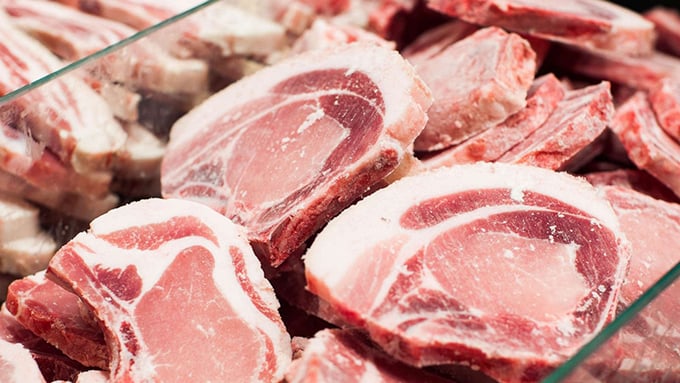May 17, 2025 | 13:23 GMT +7
May 17, 2025 | 13:23 GMT +7
Hotline: 0913.378.918
May 17, 2025 | 13:23 GMT +7
Hotline: 0913.378.918
According to the customs authorities, in the first month of this year, Vietnam imported pork from 13 markets, with Russia being the largest supplier, accounting for nearly 45% of total imports. The average price of frozen pork imported into Vietnam was USD 2,672 per ton, up 20.8% compared to the same period last year.

The decline in restocking has led to limited supply, forcing importers to increase imports to compensate.
Frozen pork is the fastest-growing imported product in the meat and meat products category. By the end of January, Vietnam had imported 74,450 tons of meat and meat products, valued at nearly USD 157 million, marking an 8.2% increase in volume and a 13.4% increase in value compared to the previous month. The main imported products include frozen poultry meat and edible by-products, fresh and frozen buffalo meat, and frozen by-products from pigs, buffalo, and cattle.
The sharp rise in imports is driven by the continuous increase in domestic live pig prices. In February, live pig prices ranged from VND 72,000 to 80,000 per kg, up by VND 6,000 - 10,000 per kg compared to the previous month. A decline in restocking has led to limited supply, forcing importers to increase imports to compensate.
According to the Ho Chi Minh City Department of Finance, contrary to the usual post-Tet price decline, live pig prices have increased this year due to supply shortages. The prolonged African swine fever outbreak has led many companies to reduce their sow herds or face a shortage of market-ready pigs, keeping pork prices high.
Live pig prices are expected to continue rising due to limited supply. While businesses have made efforts to stabilize prices, to ensure long-term operations, the Task Force and enterprises have agreed to adjust the market stabilization price for pork, increasing by VND 5,000 - 13,000 per kg, with an average rise of VND 8,000 per kg. The average adjustment rate is 6.9%, lower than the increase in live pig prices.
Translated by Kieu Chi

(VAN) In the face of counterfeit and imitation products, Khanh Hoa Salanganes Nest Company hopes for the prompt completion of the legal framework, strict enforcement against violations, and protection of the bird’s nest brand.

(VAN) Japan's efforts to lower the price of rice through the release of its stockpile may finally be making some progress, albeit at a snail's pace.

(VAN) U.S. tariffs are not only a 'shock', but also an opportunity for Vietnamese businesses to renew their mindset toward comprehensive development.

(VAN) As Bac Giang lychee enters the harvest season, Minister Do Duc Duy expects that the fruit will contribute greatly to agricultural exports due to standardized production and deep processing.

(VAN) Consumers have shown a preference for free-range eggs, but those farming systems are more vulnerable to biosecurity risks like bird flu.
/2025/05/09/5701-1-184335_301.jpg)
(VAN) Vietnam’s eel exports nearly doubled thanks to a mud-free farming model, opening up new prospects while still facing numerous barriers related to international standards.

(VAN) Minister Do Duc Duy warned that if production is not professionalized and supply chains are not transparent, the U.S. market could become a growth bottleneck.